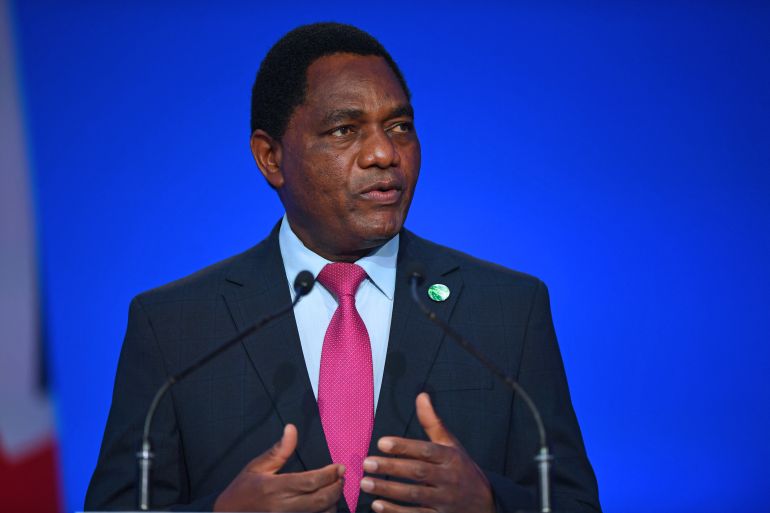Zambia’s President Hichilema goes eight months without salary
The Zambian leader, who was elected into office last August, says a salary was not his motivation for seeking public office.

Zambia woke up on Monday to a social media frenzy over the knowledge of its president having gone the entire eight months since his election without pay.
The ministry responsible for paying presidential wages and allowances had claimed that Hakainde Hichilema has forgone wages “in his interest to serve the public”.
Keep reading
list of 3 itemsIMF loan ‘important’ to its finances: Zambian finance minister
Zambia elects first woman as parliament speaker
In response, Hichilema, who was elected president last August, said a salary was not his motivation for seeking public office.
“The issue of the salary is a non-issue because money was not our motivation for seeking public office and not that the government was not willing to pay,” he told reporters on arriving in the country’s southern city of Livingstone, where he is due to receive Rwandan President Paul Kagame on a state visit.
“It is just that I have not paid attention to that [presidential salary]”, he added. “My intention and motivation is to see how we can better the lives of the people.”
Hichilema, 59, an economist and businessman with local and international links, became president after a 15-year haul in the opposition, defeating then-incumbent Edgar Lungu by more than a million votes.
His election followed campaign promises to heal an ailing economy by rooting out corruption and creating jobs for the masses, especially youths.
But his wealth came up for scrutiny during the elections as political opponents claimed that he made his fortune from association with the controversial privatisation of state assets in the 1990s.
Sean Tembo, a leader of the country’s Patriots for Economic Progress party and one of Hichilema’s fierce critics, said it was OK for Hichilema to forfeit his wages because “he had failed to deliver on his campaign promises”.
Hichilema’s decision is still being seen by some as a humane gesture amid a tough economic period for the country but is not an entirely new idea in Zambia.
In 2016, his predecessor Lungu took a 50 percent pay cut and three years later, another of between 15 and 20 percent to support government austerity measures introduced to meet the country’s debt repayment obligations.
He extended the 2019 decision to his highly paid cabinet appointees, but Hichilema’s United Party for National Development then described the move as deceptive.
In 2018, Lungu’s government amended legislation around presidential emoluments and allowances which saw the president start earning 40,653.25 kwacha ($2,307) in a monthly salary and 10,784.41 kwacha ($612) in monthly allowances.
Since his election, Hichilema has also been residing in his private residence in New Kasama, a plush residential area of the capital, Lusaka, miles away from Nkwazi House – the official residence of the Zambian president located within State House grounds.
There was however no indication that Hichilema had given up other presidential benefits.
Hichilema’s net worth is estimated to be in the millions of dollars and he has previously been reported to hold shares in local hotels and the cattle processing industry as among his income sources.
He did not publicly declare his assets prior to the August polls, as the law did not compel candidates to do so.
Lungu had threatened Hichilema with arrest if he had won re-election, saying the then opposition leader had a lot to explain for how he became wealthy yet the privatisation process left the majority in squalor.
Other African leaders to have previously taken pay cuts in the last two years include South African President Cyril Ramaphosa, Ghana’s Nana Akufo-Addo, Malawi’s Lazarus Chakwera and Uhuru Kenyatta of Kenya.